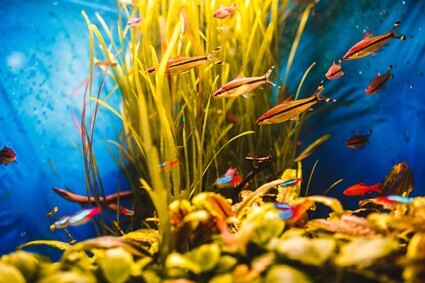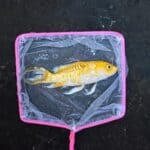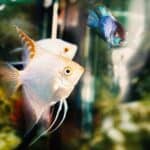Fish jump out of the water, resulting in suffocation and death. Sometimes, owners lose fish this way because the tank’s conditions aren’t quite right.
Jumping is a defense mechanism against predators and poor conditions.
Fish may jump out of the tank if it doesn’t contain enough dissolved oxygen. Also, they may try to escape if too much ammonia and nitrites are in the water.
Other causes include a poor sleep cycle, a lack of tank space, parasites, diseases, and a lack of hiding spots. For some fish, jumping is instinctual.
How Do Fish Leap Out of The Water?
Fish can leap many inches into the air, jumping straight out of the water.
They bend backward over their tail, forming a C-shape. Then, they flick themselves forward while paddling with their fins as quickly as possible.
This creates an up-and-down wave-like motion throughout the fish’s body (undulation), launching them through the water’s surface into a long arch, causing them to land outside the tank.
This impressive jumping technique allows fish to leap from a fixed position.
How High Can Fish Leap?
Most aquarium fish can jump a couple of inches into the air – just enough to fall out of the tank.
Betta fish can leap 2-3 inches into the air. Other species, like the hatchetfish, can jump as high as 5 feet into the air, making them one of the most accomplished aquatic jumpers.

Why Did My Fish Jump Out Of The Tank?
Fish jumping out of water isn’t normal. However, when they jump, they do so with purpose. In most cases, fish leap out of their tank to seek a different body of water.
Unfortunately, there’s rarely any water for fish to jump into in captivity, meaning they hit the floor and suffocate to death. The reasons for their behavior include:
Low Water Quality
Check the water for ammonia and nitrites if fish start leaping out of the tank. If ammonia or nitrate levels are too high, clean the water to save the fish.
The signs of high ammonia levels in fish tanks include:
- Foul odor.
- Fish gasping at the tank’s surface.
- Lethargy.
- Inappetence.
- Red or cloudy eyes.
- Redness around the gills.
It’s easy to remove once you know that harmful ammonia is in the tank. The challenge is acting quickly enough to prevent the fish from enduring long-term damage.
Ammonia poisoning is impossible to cure. These side effects include:
- Infections.
- Blindness.
- Recurring sores.
- Compromised immune system.
- Difficulty breathing.
- Torn fins.
Fish will exit the tank rather than endure these painful symptoms.
Low Oxygen
Fish will jump out of their tank if there’s a lack of dissolved oxygen in the water.
While it’s difficult to determine when oxygen levels are low, it’s caused by:
- Stress.
- Poor water quality.
- Lack of aeration.
- Too many fish.
- Algae buildup.
Fish don’t have lungs, so they need dissolved oxygen to breathe. According to the U.S. Geological Survey, fish consume dissolved oxygen through their gills.
If they can’t do so, they’ll leap out of the water to find a water source with more dissolved oxygen, not realizing that this doesn’t exist.
The signs of low oxygen levels include:
- Gasping for air at the tank’s surface.
- Low energy causes fish to stop swimming or moving.
- Imbalanced or uncoordinated swimming.
- Loss of appetite.
- Labored breathing.
- Rapid gill movement.
Fish only jump out of the water in extreme circumstances, so add more dissolved oxygen to the tank to prevent the fish from suffocating or unwittingly leaping to their deaths.
Adding too much oxygen to the tank can result in gas bubble disease.
Poor Sleep Cycle
Scientists believe that most fish sleep in similar sleeping cycles to humans. Most fish species are diurnal, meaning they’re active during the day and sleep at night.
They become restless and frustrated if the conditions aren’t emulated in captivity. A lack of sleep also causes them to become stressed and forces them to leap out of their tank.
All tanks need a period of darkness, so turning off the light at night and keeping the tank illuminated during the day allows the fish to conserve energy.
According to the National Ocean Service, fish “sleep” by reducing their activity and metabolism. They also remain alert to danger, floating in place or wedging themselves into the substrate.
Avoiding Prey
According to PLoS One, some fish jump out of the tank to avoid predators. When smaller prey fish share a tank with larger predator fish, they aim to confuse the predator by leaping out of the water.
While jumping is ineffective for captive fish, they lack the brain capacity to understand that there isn’t another body of water nearby.
Some fish jump out of their tank to catch flies and insects around the aquarium. This includes species that feast on insects, including:
- Blackskirt tetras.
- Jack Dempsey fish.
- Tiger barb.
- Betta fish.
- Angelfish.
Maintaining a regular feeding schedule and ensuring the fish have enough is beneficial.
Lack Of Room
Fish need room to swim and grow. If they don’t, they become ill and depressed. They also develop several behavioral problems resulting from their environment.
Fish in overcrowded or tiny tanks are at risk of:
- Stunted growth.
- Aggressive tankmates.
- Stress.
- Ammonia poisoning.
- Reduced oxygen levels.
- Fatty liver disease.
These conditions aren’t conducive to a happy home, so fish attempt an escape by jumping out of their tank in search of somewhere better.
You’ll know if the tank is too small because the fish inside:
- Lack of swimming space.
- Lose their appetite.
- Develop diseases.
- Grow depressed.
The only way to prevent fish from making a getaway is to improve the conditions and provide a roomier tank. This will reduce their stress levels and make them more comfortable.
Parasites And Diseases
Sometimes, the friction of jumping out of the water relieves their itchy skin temporarily.
Lack of Hiding Spaces
Fish swim in and out of plants and decorative features as a form of mental stimulation and enrichment. Shy fish also use them to hide from larger, dominant fish, protecting themselves from danger.
Without enough hiding spaces, some fish feel threatened and vulnerable. They’ll also become stressed, which will make them unwell. Fish will flee the tank to find somewhere better to live.
Natural Behavior
Some fish live in water sources that dry up in the summer. They have no choice but to jump out of the water to find somewhere more suitable.
Some fish breathe through an organ called the labyrinth. This allows them to breathe longer, giving them a better chance of finding water. Labyrinth fish include:
- Betta.
- Blue gourami.
- Chocolate gourami.
- Croaking gourami.
- Dwarf gourami.
- Giant gourami.
- Honey gourami.
- Kissing gourami.
- Moonlight gourami.
- Paradise fish.
- Pearl gourami.
- Powder blue gourami.
- Snakeskin gourami.
- Sparkling gourami.
- Three-spot gourami.
Some fish retain these jumping instincts, even in captivity.
How To Stop Fish Jumping Out Of Tank
You must prevent them from doing so because you won’t always be around to put the fish back into the tank if they jump out. To protect the fish, follow these steps:
Cover The Top
The best way to prevent fish from getting out of their tank is to use a cover.
Glass lids are more durable and practical. They’re also easier to clean and prevent evaporation. However, plastic covers are also suitable for budget-conscious shoppers.
Maintain Tank Hygiene
You must perform a bi-weekly water change to protect the aquarium from ammonia and nitrites. Replace between 10 to 20% of the tank’s volume with fresh water. Then, follow these steps:
- Dechlorinate the water and scrub the tank’s sides to remove algae and bacteria.
- Siphon out all waste that has settled on the substrate to prevent it from decomposing.
- Clean out the filter, swooshing it in the tank’s water. Don’t run it under a faucet.
Doing this every other week will prevent ammonia and nitrite levels from rising.
Choose Compatible Tankmates
Establish a community of fish likely to live in harmony with each other. You must research your favorite fish to see if they’re compatible with tankmates.
Wherever possible, gather fish from the same region, as they’ll communicate with each other in similar ways. For example, angelfish get on well with:
- Larger tetras.
- Rainbowfish.
- Gourami.
- Corydoras.
- Larger rasboras.
- Catfish.
- Mollies.
- Plecos.
Some fish species shouldn’t live with closely related species.

Choose A Bigger Tank
There are three popular methods for measuring the correct tank size, which are:
- The one-inch per-gallon rule.
- The two-inch-per-gallon rule.
- The aquarium’s floor and surface area calculation.
The size you choose depends on the number of fish, along with their shape and size. If you lack room for a larger tank, remove some fish and put them in a separate tank.
Add Plants And Ornaments
Offer the fish hiding spaces from other fish by adding plenty of plants and decorative features they can swim among. This provides mental stimulation and allows them to hide when vulnerable.
Limit Noise
Sound travels 10 times faster in water than in air. Loud, constant noise disturbs fish, making them stressed and uncomfortable. To escape the noise, they’ll leap out of the tank.
To prevent this, put the fish tank in a quiet room. Turn off all electricals when they’re not in use.
Increase Oxygen Levels
Low oxygen levels force fish to leave the tank for better conditions. Do the following to increase the aquarium’s oxygen levels:
- Add plants.
- Provide quality substrate, like fine gravel, small stones, or sand.
- Buy a tank with a bigger surface area.
- Increase surface agitation using a surface bubbler, HOB filter, powerhead, wavemaker, or spray bar and sprinkler.
Ensure the tank isn’t overstocked because this will rapidly deplete the oxygen supply.
Aquarium Fish That Don’t Jump
All fish can jump out of their tank and will do so if their conditions are unsuitable.
You must do everything possible to prevent this, keeping the fish safe. This is especially important if you’re not always around to put the fish back in the tank.







